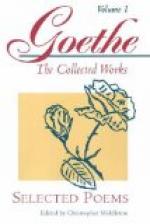While we thunder our: Ergo bibamus!
1810. ----- Epiphanias.
The three holy kings with their star’s
bright ray,—
They eat and they drink, but had rather not pay;
They like to eat and drink away,
They eat and drink, but had rather not pay.
The three holy kings have all come here,
In number not four, but three they appear;
And if a fourth join’d the other three,
Increased by one their number would be.
The first am I,—the fair and the white,
I ought to be seen when the sun shines bright!
But, alas! with all my spices and myrrh,
No girl now likes me,—I please not her.
The next am I,—the brown and the long,
Known well to women, known well to song.
Instead of spices, ’tis gold I bear,
And so I’m welcome everywhere.
The last am I,—the black and small,
And fain would be right merry withal.
I like to eat and to drink full measure,
I eat and drink, and give thanks with pleasure.
The three holy kings are friendly and mild,
They seek the Mother, and seek the Child;
The pious Joseph is sitting by,
The ox and the ass on their litter lie.
We’re bringing gold, we’re bringing myrrh,
The women incense always prefer;
And if we have wine of a worthy growth,
We three to drink like six are not loth.
As here we see fair lads and lasses,
But not a sign of oxen or asses,
We know that we have gone astray
And so go further on our way.
-----
Ballads.
----- Poet’s art is ever able To endow with truth mere fable. —— Mignon. [This universally known poem is also to be found in Wilhelm Meister.]
Know’st thou the land where the fair citron
blows,
Where the bright orange midst the foliage glows,
Where soft winds greet us from the azure skies,
Where silent myrtles, stately laurels rise,
Know’st thou it well?
’Tis there, ’tis there,
That I with thee, beloved one, would repair.
Know’st thou the house? On columns rests
its pile,
Its halls are gleaming, and its chambers smile,
And marble statues stand and gaze on me:
“Poor child! what sorrow hath befallen thee?”
Know’st thou it well?
’Tis there, ’tis there,
That I with thee, protector, would repair!
Know’st thou the mountain, and its cloudy bridge?
The mule can scarcely find the misty ridge;
In caverns dwells the dragon’s olden brood,
The frowning crag obstructs the raging flood.
Know’st thou it well?
’Tis there, ’tis there,
Our path lies—Father—thither,
oh repair!
1795.* ----- The minstrel.
[This fine poem is introduced in the second book of Wilhelm Meister.]
“What tuneful strains salute mine ear
Without the castle walls?
Oh, let the song re-echo here,




